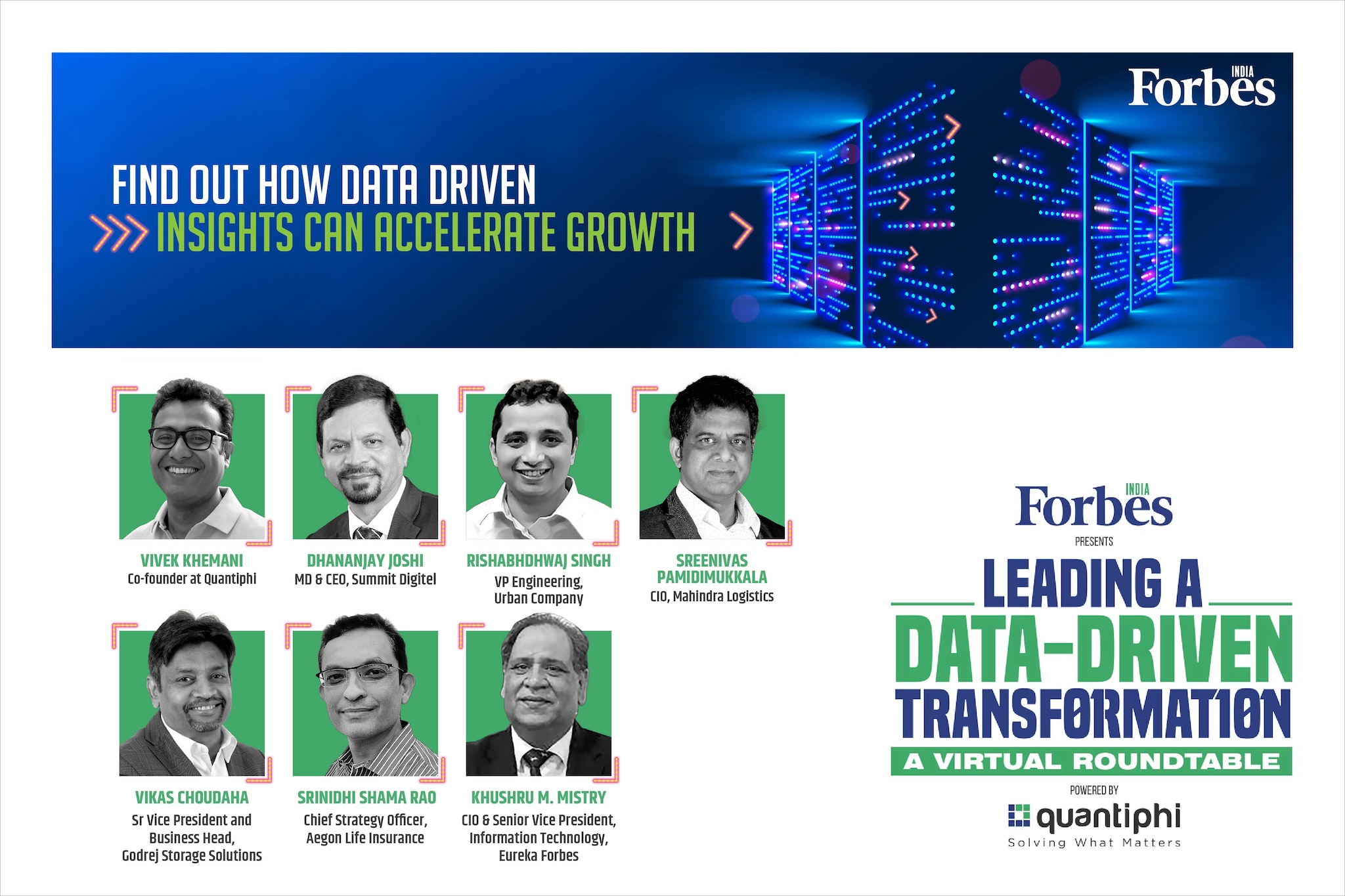Moving from the 'Digital is the future' to 'The future is digital' mindset
Data-driven digital transformations are the key to differentiation and industry leadership



Until recently, decision-making by the leaders of enterprises has been primarily based on their inherent human resources - knowledge, experience, and insights guided by assumptions, personal experiences, individual perspectives, risk profiles, and intuition. Data has merely played a supportive role in molding such decisions.
In the present digital age, critical and analytical thinking take precedence with the most successful enterprises relying on data to make business decisions. Data-driven decisions can be relied on to hedge against human biases and personal agendas with objectivity and an inherent commitment to company-level priorities to deliver more universally beneficial outcomes.
To explore how organizations can fast-track their growth by making more data-driven decisions and overcome challenges on their digital transformation journeys, Forbes India and Quantiphi hosted a virtual panel discussion themed, ‘Leading A Data-Driven Transformation’.
The power-packed panel had representation from a range of segments and leaders, including Vivek Khemani, Co-founder, Quantiphi - an AI-First Digital Engineering company Dhananjay Joshi, MD & CEO, Summit Digitel Khushru M. Mistry, CIO & Senior Vice President, Information Technology, Eureka Forbes Sreenivas Pamidimukkala, CIO, Mahindra Logistics Vikas Choudaha, Sr. Vice President and Business Head, Godrej Storage Solutions Srinidhi Shama Rao, Chief Strategy Officer, Aegon Life Insurance and Rishabhdhwaj Singh, VP, Engineering, Urban Company.
Vivek Khemani, Co-founder Quantiphi set the tone for the discussion by noting what it means to aim for a data-driven future. “There needs to be a flip in mindsets it’s not about whether digital is the future but that the future is digital," he said. He suggested that tech stacks will have to be completely reimagined to support transformations that disrupt at all layers. “Corporations must discover the ‘why’ behind their transformation and prioritize the reasons for doing it."
Coming from a digital native enterprise, Rishabhdhwaj Singh, Urban Company explained what digital transformation meant to his company. “Bringing about a mindset shift is easier for us but it is still a challenge in some sense. The two biggest hurdles that digital native organizations face are barriers to capturing and usage of data and ensuring that we do not take gut calls but data-driven calls."
On the other side of the spectrum, Sreenivas Pamidimukkala, Mahindra Logistics shared his experience of working with a company that was born before the digital age. “For me, data is not a project it’s a journey. You have to constantly innovate and find new trends. With the deluge of data expected, we have to find new ways to use it so that it benefits the organization and the customers’ organizations."
Representing the BFSI space, Srinidhi Shama Rao, Aegon Life Insurance offered a view on how companies on the other side of the table measure the value of data or the return on investing in data and analytics. “The most obvious measure is to look at the ROI of investing in tech stacks, data sciences, and analytics. While that is relevant, it is a rather myopic approach." He observed that when a company adopts data analytics and seeks to reinvent customer journeys, there are numerous metrics that are more important than ROI. “A broader approach will determine the revenue lift you get in the longer term due to deeper customer engagement," he said.
“Customer-centricity has always been the cornerstone of our strategy," said Khushru Mistry, Eureka Forbes. “However, our selling techniques have shifted from being very emotion-based to very data-driven." He narrated how his company was able to utilize technology and data analytics to come up with
Products, services, and mobile applications through which it could communicate with the customer remotely. “That contributed to creating lifetime value with the customer."
Vikas Choudaha, Godrej Storage Solutions shared, “While driving the transformative journey forward, it"s not just about us, it"s more about the customers." Giving an example from his business, he explained that the storage solutions are not only crafted to meet the needs of customers who operate warehouses and e-commerce, they also take into account the customers’ customers as well as other users of the systems, and the technology deployed at the warehouses.
People say data is the new oil, but Dhananjay Joshi, Summit Digitel dubbed it as the new currency. “Behind every good decision, there is a lot of data that is required," he said. “As we get deeper into 5G, we are going to see huge amounts of data being generated, not just by humans but machine-to-machine communication too, and the biggest challenge will be data literacy. While solutions to capture and store data and various analytical tools are now available, the human mindset must be amenable too."
The panel also discussed human perceptions of a tradeoff while adopting a data-driven strategy,
legacy issues that create hurdles to the transition to data-driven decisions, the benefits and pain points of outsourcing the transition journey, security during data transformation and policies to protect personal data, goal setting and prioritizing solutions, and various other related issues.
The broad consensus that emerged was that unless organizations take a responsible approach throughout the transformation process, they may find early successes but miss larger, long-term benefits, which are far more significant. The interaction of humans and digital could create a
Reinforcing ‘yin-and-yang’ relationship wherein human qualities of exploration and experimentation are amalgamated with execution and measurement enabled by technology to deliver unprecedented outcomes.
The pages slugged ‘Brand Connect’ are equivalent to advertisements and are not written and produced by Forbes India journalists.
First Published: Jan 31, 2022, 20:44
Subscribe Now